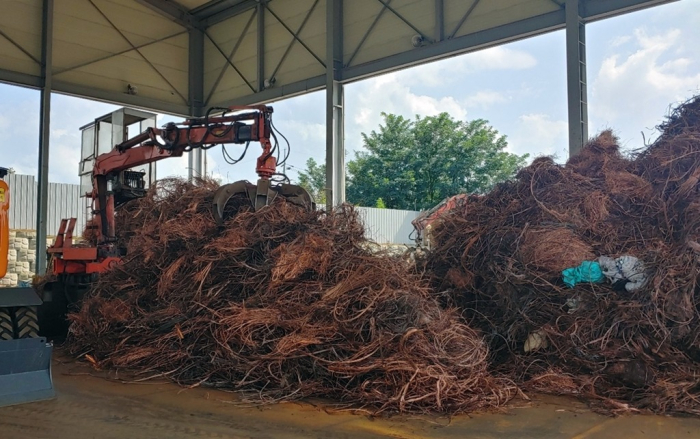-
KOSPI 2697.67 -22.97 -0.84%
-
KOSDAQ 734.35 -1.94 -0.26%
-
KOSPI200 359.62 -3.46 -0.95%
-
USD/KRW 1381 -7.00 0.51%
Korea struggles with surging copper scrap exports to China
Commodities
Korea struggles with surging copper scrap exports to China
Chinese companies buy copper scrap from Korean firms in cash without invoices to avoid VAT; sellers can bypass taxes
By
Mar 18, 2024 (Gmt+09:00)
5
Min read
News+

South Korea’s nonferrous metal industry is scrambling for the procurement of copper scrap as China, the world’s top copper consumer, has taken advantage of a Korean tax loophole to aggressively import the valuable scrap metal from the peninsula.
Copper scrap exports to China were forecast to nearly double to 24,967 tons in the first quarter of this year from a year earlier, according to the South Korean customs office and the Korea International Trade Association on Monday. That was likely to account for 73% of the country’s total copper scrap exports.
Scrap shipments to China had already quadrupled to 67,043 tons last year from 16,340 tons in 2020. But the volume was estimated to be up to about 100,000 tons as some copper scrap was shipped to other countries such as Thailand and Malaysia for refining and eventually moved to the mainland, industry sources in Seoul said.
China, which makes up about 55% of the global copper consumption, has been increasing the use of copper scrap as recycling scrap has much lower carbon emissions than smelting copper ore, industry sources in Seoul said. China does not have sufficient copper scrap, which is usually procured from construction waste materials, as there are not many demolished buildings in the country, according to the sources.
The country’s aggressive copper scrap imports put South Korean copper product manufacturers and distributors at risk, domestic industry sources said.
“The ecosystem of some 170 copper producers is expected to collapse if the situation is left as it is,” said Korea Nonferrous Metal Association (KONMA) Managing Director Lee Seung-Hoon at a meeting of member companies such as Poongsan Corp., KBI Metal Co. and Daechang Co. for measures to deal with China’s surging copper scrap imports.
Copper Scrap is the most valuable scrap metal commonly used in construction, motors, industrial machinery, and electronics that can be recycled and reformed without losing its quality.
CUT PRODUCTION, GO BANKRUPT
Many South Korean copper product manufacturers already reduced production as they failed to procure copper scrap, while some went bankrupt, according to industry sources.
A copper ingot maker has been manufacturing only 100 tons a month, only 10% of its normal production, since December last year.
“We cannot make products as China took all scrap,” said the head of the company.
A brass pipe maker logged an operating loss of about 7 billion won ($5.2 million) in 2023, swinging from annual profits of some 10 billion won in previous years, as it spent more on scrap procurements amid the local supply shortage.
Another brass pipe manufacturer has been struggling to cope with insufficient copper scrap.
“We need an inventory of 2,000 tons at least, but we are currently only managing to operate the factory with materials that come every day,” said its head. “That reduced production volume by more than 30%.”
TAX LOOPHOLE
A South Korean tax loophole is behind the increased copper scrap exports to China, local industry sources said.
The government levies a heavy tax on sales of the scrap procured without proper tax invoices, prompting domestic copper scrap providers to sell the scrap metal to companies that pay in cash without any documentation to ship it to China, according to the sources.
“It is almost impossible for local junk shops to invoice for scrap from elderly workers pulling it in handcarts or constructors demolishing small buildings,” said an official at a domestic copper scrap distributors’ association.
“Those junk shops need to pay more than 30% in income taxes when they sell copper scrap that they bought without documentation, however. Chinese buyers are absorbing the scrap, taking advantage of the loophole.”
About 650,000 tons of copper scrap are distributed in South Korea a year, of which 30-40% is estimated to be traded without tax invoices, according to the KONMA.
The tax authority frequently launches tax audits on copper scrap distributors, causing them to sell more to Chinese buyers, industry sources said.
“It is much better to sell to Chinese customers as the authority -- which often sees tax invoices on transactions that were fake deals -- impose taxes of millions of dollars,” said a medium-sized copper scrap distributor official.
Chinese buyers pay cash in deals without asking for tax invoices, allowing South Korean sellers to avoid taxes. By paying in cash, the Chinese can avoid their country's value-added tax, or 10% of the sales price, on the transactions.
The practice prevents the tax authority from collecting massive amounts of taxes since scrap priced at 10,800 won per ton as of Monday is usually traded in up to tens of tons, industry sources said.
“About 1 trillion won worth of copper scrap was shipped to China without paying taxes last year,” KONMA’s Lee said. “The government needs to take measures [against this] for economic security.”
MAJOR TRADERS
Several Chinese copper scrap buyers have secured enough to become a liaison between sellers in South Korea and shipments to the mainland.
“A few years ago, small importers from China bought tiny amounts of copper scrap. But they are now managing exports on large scale with nationwide networks,” another South Korean copper scrap distributor’s official.
Some of the Chinese traders report copper scrap as iron scrap, which is much cheaper than that of copper, when they ship it home to reduce the local 13% VAT, industry sources in Seoul said.
The South Korean government needs to reduce exports of copper scrap, recognize the costs of the scrap procurements and find a way to legalize deals without tax invoices to solve those issues, the sources said.
The government has yet to agree to any such measures, however.
The finance ministry is not showing any interest in legalizing transactions without documentation due to the principle of equity in taxation. The trade ministry is also reluctant to accept all the requests of the industry.
Write to Jeong-Seon Lee at leeway@hankyung.com
Jongwoo Cheon edited this article.
More To Read
-
Jan 04, 2024 (Gmt+09:00)
-
May 26, 2021 (Gmt+09:00)




